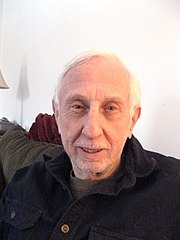Lloyd deMause
reliable, independent, third-party sources. (May 2019) |
Lloyd deMause | |
|---|---|
 Lloyd deMause | |
| Born | September 19, 1931 Detroit, Michigan, U.S. |
| Died | April 23, 2020 (aged 88) |
| Occupation | Psychohistorian |
| Nationality | American |
Lloyd deMause (pronounced de-Moss; September 19, 1931 – April 23, 2020) was an American lay psychoanalyst and social historian, best known for his pioneering work in the field of psychohistory.
He graduated from
Psychohistory
Beginning in the 1970s, DeMause began conceiving of psychohistory, a field of study of the psychological motivations of historical events, and their associated patterns of behavior. It seeks to understand the emotional origin of the social and political behavior of groups and nations—past and present—by analyzing events in childhood and the family, especially child abuse.
Psychohistorians endorse trauma models of schizoid,

With the exception of the "helping mode of childrearing" (marked in yellow above), for psychohistorians the major childrearing types are related to main psychiatric disorders, as can be seen in the following Table of Historical Personalities:
| Childrearing | Personality | Historical manifestations |
|---|---|---|
| Infanticidal | Schizoid | Mesoamerica, the Incas; in Assyrian and Canaanite religions. Phoenicians, Carthaginians and other early states also sacrificed infants to their gods. On the other hand, the less abusive Greeks and Romans exposed some of their babies to death.
|
| Narcissistic | ||
| Abandoning | Masochistic | Longer oblation of children to monasteries and nunneries, and apprenticeship .
|
| Ambivalent | Borderline | Although the later Middle Ages ended the abandonment of children to monasteries, "ambivalent" parents tolerated extreme love and hate for the child without the two feelings affecting each other. Enemas, early beating, shorter swaddling, mourning for deceased children, a precursor to empathy. |
| Intrusive | Depressive | The intrusive parent began to unswaddle the infant. Since infants were now allowed to crawl rather than being swaddled, they had to be formally "disciplined", threatened with hell; use of guilt. Early toilet training, repression of child's sexuality, end of swaddling and wet-nursing, empathy now possible, rise of pediatrics .
|
| Socializing | Neurotic | Use of "mental discipline"; teaching children to conform to the parents' goals, socializing them. Hellfire and physical discipline disappeared. Rise of compulsory schooling . The socializing mode is still the main mode of upbringing in the West.
|
| Helping | Individuated | Absolute end of humiliation to control the child. The helping parent tries to assist the child in reaching its own goals rather than socializing him or her into adult goals. Children's rights movement, deschooling. |
According to deMause's research, each of the above psychoclasses coexist in the
Legacy
In a 1994 interview with deMause in The New Yorker, interviewer Stephen Schiff wrote that "to buy into psychohistory, you have to subscribe to some fairly woolly assumptions [...], for instance, that a nation's child-rearing techniques affect its foreign policy", but confessed that "deMause's analyses have often been weirdly prescient."[2]
Controversy
Contributing to his ostracization from psychoanalytic circles, deMause was a contributor to the
Publications
DeMause published over 90 scholarly articles and several books.
Books
- DeMause, Lloyd (1974). The History of Childhood. New York: Harper and Row. ISBN 0061318485.
- DeMause, Lloyd (1975). A Bibliography of Psychohistory. Vol. 2. New York: Garland Pub. pp. 517–62. )
- DeMause, Lloyd (1975). The New Psychohistory. New York: Psychohistory Press. ISBN 0-914434-01-2.
- Ebel, Henry; DeMause, Lloyd (1977). Jimmy Carter and American Fantasy: Psychohistorical Explorations. New York: Two Continents. ISBN 0-8467-0363-7.
- DeMause, Lloyd (1982). Foundations of Psychohistory. New York: Creative Roots. ISBN 0-940508-01-X.
- DeMause, Lloyd (1984). Reagan's America. New York: Creative Roots. ISBN 0-940508-02-8.
- DeMause, Lloyd (1995). The History of Childhood (reprint). Northvale, New Jersey: Jason Aronson. ISBN 1-56821-551-7.
- DeMause, Lloyd (2002). The Emotional Life of Nations. New York: Karnac. ISBN 1-892746-98-0.
- DeMause, Lloyd (2010). The Origins of War in Child Abuse. The Institute for Psychohistory.
Articles (selection)
- DeMause, Lloyd (1974): The Evolution of Childhood. In: History of Childhood Quarterly: The Journal of Psychohistory, 1 (4), p. 503-575. (Comments and reply: p. 576-606)
- DeMause, Lloyd (1987): The History of Childhood in Japan. In: The Journal of Psychohistory, 15 (2), p. 147-151.
- DeMause, Lloyd (1988): On Writing Childhood History. In: The Journal of Psychohistory, 16 (2), p. 35-71.
- DeMause, Lloyd (1989): The Role of Adaptation and Selection in Psychohistorical Evolution. In: The Journal of Psychohistory, 16 (4), p. 355-372 (Comments and reply: p. S. 372–404).
- DeMause, Lloyd (1990): The History of Child Assault. In: The Journal of Psychohistory, 18 (1), p. 1-29.
- DeMause, Lloyd (1991): The Universality of Incest. In: The Journal of Psychohistory, 19 (1), p. 123-164.
- DeMause, Lloyd (1997): The Psychogenic Theory of History. In: The Journal of Psychohistory, 25 (1), p. 112-183.
See also
Notes
- ^ "The Evolution of Psyche and Society by Lloyd deMause". primal-page.com. Retrieved 2021-05-29.
- ^ Stephen Schiff (December 5, 1994). "The Talk of the Town, "Bad Mommies and Other Omens"". The New Yorker. p. 55.
- ^ "PsycNET". psycnet.apa.org. Retrieved 2019-07-22.
- ISSN 1359-1789.
- S2CID 1110453.
